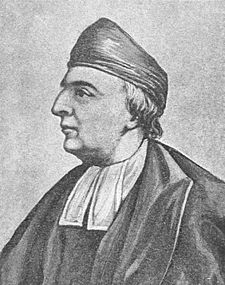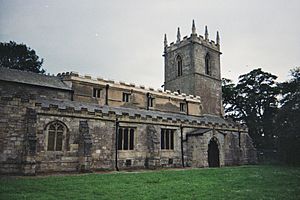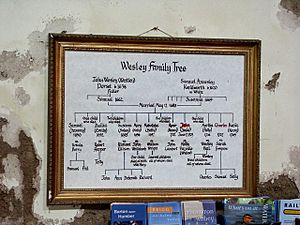Samuel Wesley (poet, died 1735) facts for kids
Quick facts for kids Samuel Wesley (poet, died 1735) |
|
 |
|
| Born | 17 December 1662 in Dorset, England |
|---|---|
| Died | 25 April 1735 (aged 72) in Epworth, Lincolnshire, England |
| Education | Exeter College, Oxford Corpus Christi College, Cambridge |
| Ordained | 17 December 1662 |
| Spouse | Susanna Wesley (m. 1688) |
| Children | 19, including John Wesley, Charles Wesley, Samuel Wesley (the Younger) and Mehetabel Wesley Wright |
| Parents | John Westley (father) |

Samuel Wesley (born December 17, 1662 – died April 25, 1735) was an important clergyman in the Church of England. He was also a talented poet and writer. Samuel Wesley is best known as the father of John Wesley and Charles Wesley. These two sons later became the famous founders of Methodism, a major Christian movement.
Contents
Samuel Wesley's Early Life and Family
Samuel Wesley was the second son of Reverend John Westley. His father was a rector, which is a type of church leader, in Winterborne Whitechurch, Dorset. Samuel's mother was the daughter of John White, another rector from Dorchester.
After attending grammar school in Dorchester, Samuel planned to train as a minister. However, his teacher, Theophilus Gale, passed away in 1678. Samuel then went to other schools, including ones run by Edward Veel and Charles Morton. Famous writer Daniel Defoe also went to Morton's school.
Samuel later left these schools, which were for "Dissenters" (Protestants who were not part of the Church of England). He walked all the way to Oxford to study at Exeter College. He worked as a "servitor," meaning he earned money by helping wealthier students. In 1685, he published a small book of poems called Maggots. The title was a bit unusual, but it showed his playful side.
Samuel Wesley's Marriage and Children
In 1688, Samuel Wesley married Susanna Annesley. They had a very large family with 19 children! Sadly, nine of their children died when they were very young. However, ten children survived, including three boys and seven girls.
Among their surviving children were Samuel Jr., Mehetabel, John, and Charles Wesley. John and Charles would later become very famous for their religious work.
Life in Epworth
In 1697, Samuel Wesley became the rector of Epworth, Lincolnshire. He got this position thanks to Queen Mary. She might have noticed him because of a long poem he wrote about the life of Christ, which he dedicated to her.
Life in Epworth was not always easy for Samuel. He had different ideas about church services and politics than some of his parishioners. This meant he wasn't always welcomed. He also struggled with money and was often in debt.
In 1709, a fire destroyed his home, the parsonage. His son John was almost trapped in the flames but was bravely rescued. The parsonage was rebuilt and is now known as the Old Rectory, Epworth.
Samuel Wesley's Career and Writings
Samuel Wesley began his writing career with Maggots in 1685. This book was a collection of poems about everyday, sometimes silly, topics. He wanted to show that poetry could make even ordinary things interesting.
After earning his degree from Oxford, he worked as a chaplain for the navy. In 1690, he became a rector in South Ormsby. He later earned another degree from Cambridge in 1694. The next year, he became the rector of Epworth.
Samuel also helped with a newspaper called the Athenian Gazette. In 1693, he published a longer poem called The Life of Our Blessed Lord and Saviour. This poem was very popular and was reprinted several times. He also wrote poems mourning the deaths of Queen Mary II and Archbishop Tillotson in 1695.
He continued to write poetry throughout his life, publishing several more books. While his poems had some readers, they didn't always get great reviews from famous writers or critics of his time.
Samuel Wesley's Beliefs
Samuel Wesley held strong Arminianist views within the Church of England. This means he believed that people have free will to choose to follow God. He also believed in "prevenient grace," which is the idea that God's grace helps people to make good choices. He often used the writings of Hugo Grotius, an Arminian thinker, to help him understand the Bible.
See also
 | Toni Morrison |
 | Barack Obama |
 | Martin Luther King Jr. |
 | Ralph Bunche |


